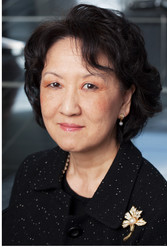Prof. Dr. Marie Seong-Hak Kim
St. Cloud State University Minnesota, USA
Curriculum Vitae
Marie Seong-Hak Kim is Professor of History at St. Cloud State University, Minnesota, USA. Following her studies at Ewha Womans University in Seoul, Korea, she was conferred a doctorate degree in history as well as a doctorate degree in law by the University of Minnesota. In 1995, she was admitted to the Minnesota Bar. In 2000, she was appointed professor. She is also a research affiliate at the Institut d'Asie Orientale in Lyon, France, and a member of the International Editorial Board of Comparative Legal History.
Prof. Kim has received numerous national and international research fellowships and awards. Among those are the National Endowment of Humanities Fellowship, the Fulbright Senior Scholar Grant (Korea), and the Academy of Korean Studies Research Fellowship. Prof. Kim was a visiting professor in Korea and a Japan Foundation Research Fellow in Tokyo. In Europe, she was a Fellow at the Collegium de Lyon, the Netherlands Institute for Advanced Study (NIAS) in Wassenaar and the Max-Planck-Institute for European Legal History in Frankfurt. From 2016 to 2017, she was a EURIAS and Marie Curie Fellow of the European Union at the Freiburg Institute for Advanced Studies.
Her research focuses on comparative legal history, with expertise in Korean, Japanese and French law.
From April to August 2019, Prof. Dr. Marie Seong-Hak Kim was Fellow at the Käte Hamburger Kolleg “Law as Culture”in Bonn.
Research project
“Law and Lineage Property in Korea”.
This project examines the legal and cultural foundations of lineage property in Korea from a historical perspective. Focus is on the courts’ role in reordering and reconstructing the institutions of family, succession, and property relations for the purpose of creating a normative and functional socioeconomic order. Confucian primacy of filial piety in premodern Korea fostered ritual instrumentalities where private rights remained subsumed under the dictates of kinship identity and ancestral worship ceremonies. In the early twentieth century under Japanese colonial rule, Korean law underwent a passage from a legal system belonging to the Chinese legal tradition to the Romano-German civil law system, and colonial judges were faced with the task to reconcile patriarchal sociocultural structures and property formations with the concepts of economic rationalization and individual rights. Interestingly, while ritual succession lost legal meaning and the process of privatization of land diminished the importance of the old lineage institution, ancestor reverence ideology and the attendant spiritual as well as social significations powerfully survived into the postcolonial years. Today South Korean courts are regularly asked to adjudicate cases steeped in Confucian patrilineal and patrimonial precepts in terms of the principles of equality and other basic rights guaranteed in the nation’s Constitution. Evolution of lineage property laws and practices in Korea offers an arena in which one can approach dialectic tensions between traditional ritual dynamic and modern legal logic in reference to historical and empirical evidence.
Publications (selected)
Monographs and edited books
- Constitutional Transition and the Travail of Judges: The Courts of South Korea, Cambridge University Press (forthcoming 2019).
- The Spirit of Korean Law: Korean Legal History in Context, Brill, Nijhoff, 2016.
- Law and Custom in Korea: Comparative Legal History, Cambridge University Press, 2012.
- Michel de L'Hôpital: the Vision of a Reformist Chancellor during the French Religious Wars, Kirksville, Truman State University Press (Sixteenth Century Essays & Studies, vol. 36), 1997.
Articles and book chapters
- “Custom as a Source of Law in European and East Asian History,” in Comparative Legal History Handbook, eds. Kjell A Modeer, Aniceto Masferrer, and Olivier Moreteau, Cheltenham: Edward Elgar Publishing (2019), pp. 186-211.
- “Michel de L'Hôpital and Christophe de Thou: Two Perceptions of Royal Justice during the French Religious Wars,” in Suum Cuique Tribuere: Legal Contexts, Judicial Archetypes and Deep-Structures Regarding Courts of Appeal and Judiciaries from Early Modern to Late Modern Europe, eds. Kjell A. Modeer and Matin Sunnqvist, Stockholm: Institutet för Rättshistorisk Forskning, Olin Foundation (2018), pp. 131-173.
- “Colonial Law Revisited: Courts, Jurisprudence and Legal Policy under Japanese Rule,” in The Spirit of Korean Law: Korean Legal History in Context, ed. by Marie Seong-Hak Kim, Leiden: Brill Nijhoff (2016), pp. 129-154.
- “Confucianism that Confounds: Constitutional Jurisprudence on Filial Piety in Korea,” in Confucianism, Law, and Democracy in Contemporary Korea, ed. Sungmoon Kim, Lanham: Rowman & Littlefield (2015), pp. 57-80.
- "Travails of Judges: Judicial Process under Authoritarian Rule in South Korea," The American Journal of Comparative Law, Vol. 63, No. 3 (2015): 601-654.
- “La coutume et la raison comme sources de droit dans la première moitié de l’ère Meiji,” in Droit japonais, droit français, Quel dialogue ?, ed. Beatrice Jaluzot, Geneva: Schulthess (2014), pp. 57-77.
- "Constitutional Jurisprudence and the Rule of Law in Korea: Revisiting the Yusin Period (1972-1980)," The Hague Journal on the Rule of Law, Vol. 5, No. 2 (2013), pp. 178-203.
- "In the Name of Custom, Culture, and the Constitution: Korean Customary Law in Flux," Texas International Law Journal, Vol. 48, No. 3 (2013): 357-391.


